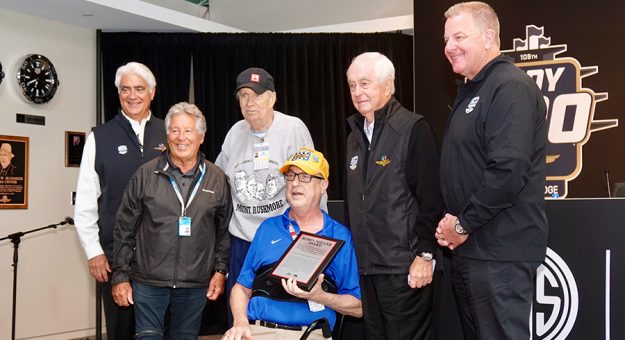INDIANAPOLIS — Half a dozen years ago, before real-world problems shook up their lives like dice, the scene would have been almost funny.
Seated in a chair placed front-and-center in the Indianapolis Motor Speedway media center was Bob Jenkins, broadcasting legend, soft-spoken and gentlemanly. Behind him stood Robin Miller, celebrated columnist and curmudgeon, as subtle as a hand grenade.
Jenkins wore a royal-blue golf shirt, tan khaki slacks and black loafers. Miller was in tennis shoes, the pants from a navy tracksuit, and a gray racing sweatshirt. This was as casual as Jenkins ever dresses, and as gussied up as you’ll ever see Miller, yet still the sartorial sweepstakes had Bob beating Robin — decorum over disarray — by several lengths.
There hadn’t been a couple this odd since Felix Unger, with no place else to go, appeared at the home of his childhood friend, Oscar Madison. But on this May morning, there was no canned laughter. Cancer is not a joking matter.
This all took place on Carburetion Day, 48 hours before Helio Castroneves drove into history and climbed a fence toward racing immortality. Sunday belonged to Helio, but Friday was for Miller and Jenkins, two Hoosier boys who grew up and carried the news of the Indianapolis 500 to every corner of this nation.
Jenkins was there to receive the Robin Miller Award, a citation created in 2019 to recognize someone who “has dedicated a significant portion of their life to Indy car racing while bringing unbridled passion and unrelenting work ethic.”
The description fit both this year’s honoree and the man for whom the award is named. Over a decades-long career in television, radio and public-address announcing, that unrelenting-work-ethic thing was the reason you never heard Jenkins caught flatfooted. He understood that when dealing with live cameras and microphones, there is no such thing as being overprepared.
And no one has ever questioned Miller’s passion, whether they agreed with his thoughts or took heated exception to them, as A.J. Foyt so famously did in 1981.
They approached their jobs very differently. Jenkins, the polite and professional anchorman, was always happy to let his color analysts shine, and mostly kept his opinions to himself. Miller’s columns and commentaries told you the truth as he saw it, and if feelings got hurt in the process, that was acceptable collateral damage.
Of course, it is risky to pigeonhole any human in absolute terms. You don’t get far in television without ego or ambition and Bob Jenkins survived in that medium for a long time.
Robin Miller may play the grouch, but he has an affinity for the down and out, with a particular weakness for unlucky racers who got dinged by crashes or by life just as they were about to hit the big time.
This past February, Jenkins went public with the fact that he was battling brain cancer. By May, when it was time to go to Indianapolis again, he needed a wheelchair and his voice was weak. In accepting his award, he talked about the side effects of his disease and apologized in advance for any confusion that might arise as he spoke. Of course, none did.
It was in the autumn of 2017 that Miller confided to pals that he’d been diagnosed with multiple myeloma, a form of bone cancer. He has since brushed off all expressions of concern by declaring himself fortunate because “as cancers go, mine is very treatable.” But, make no mistake, the treatments take a lot out of him.
In presenting the award, Miller made Jenkins’ success sound inevitable, the result of “(putting) his talent together with the fact that he’s so personable and so humble and so likable.”
Then Miller’s voice dipped a bit. Speaking not to the crowd, but to his colleague and fellow cancer patient, Robin said, “We’re on the same team.”
Bob’s reply was quiet but firm: “Yup.”
Their contributions to the game have been immense. After the formalities, Mario Andretti said, “These are the guys who have been the link between us and the fans. It was the way they represented and exposed the excitement in this sport. We take them for granted, but they are more important than we can ever express.”
Miller attended his first 500 in 1959, a year before Jenkins saw his. The great race got its hooks into them and in turn they helped it hook thousands, maybe millions, of others. Jenkins carefully placed the right words in impressionable ears. Miller’s descriptions of the event and its participants hit readers right between the eyes.
Either way, folks wanted to go and see what the fuss was about.
The gathering was breaking up now and it seemed for an instant that this might be a good time to corner Bob Jenkins and to pull Robin Miller aside, just to mutter an overdue “thank you.”
For what? For everything. But Jenkins, an admitted softie, would have teared up and no one wanted that. Miller might have grinned and suggested something anatomically impossible. So the moment passed.
Elsewhere, people were packing cars for road trips and rechecking their airline reservations. There were only two days left until the Indianapolis 500, a race they had heard and read about forever.
